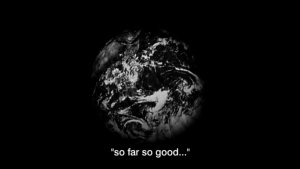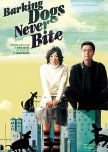Esta resenha pode conter spoilers
"Conscience is the dog that can't bite, but never stops barking." -Unknown
I absolutely loved Parasite so the next step for me was to go to the start of Bong Joon-ho's filmography. While I can't say that 'Flandersui Gae' is as clear and polished of a gem as Parasite, it definitely feels like a spiritual precursor- not least because of the dark humor, tonal shifts and class/poverty centred themes. Seeing the basement dwelling hobo, privileged little dogs and fumigation, I wondered whether director Bong was conscientiously building on this film as he shot his Palme D'or/ Academy Award winning flick almost twenty years later.
For a film that depicts taboo practices, 'Flandersui Gae' is surprisingly charming and droll, and while it takes pleasure in dispensing of its small and fluffy friends it makes sure to make you feel guilty for feeling the same way afterwards. The notion that actions have consequences, while not a central idea, is something that is dwelled upon.
While focusing on an unemployed lecturer and a bored book-keeper, it expands to capture the lives of those living in the central apartment complex. With the exception of the hobo, none of them are desperately poor. They can afford to buy groceries, to get drunk out of their minds, to keep pets despite the apartment's rules. But they are effectively prisoners of their mediocre social situations, sentenced indefinitely to a boring future. They seem to represent a demographic of Korean society that has hit a dead end in life- a dead end that can only be broken through via a pipe dream or moral transgression. Their aimlessness, opportunism and crushed hope are depicted empathetically by director Bong. After all, he had once stood in their shoes, having lived in that same apartment complex prior to directing. Considering this, I personally think that Yun-Ju is driven to murderous intent because the incessant barking reminds him of his mediocre standing in life. Its as if the pampered dogs are taunting the laid-off academic who, even within his prison of an apartment, is emasculated and controlled by his demanding wife. While he and Hyun-nam have dreams of their own, these aspirations are silenced by their social situations. Only at the film's end, when he resorts to bribery and she is fired from her job, do they catch a break from their servitude.
'Flandersui Gae' is one of those films that is more on the implicit side, a given due to a number of dialogue-absent scenes and some slightly overlong tangents. Nonetheless, it is intriguing and thought-provoking, and I think that it will get even better on a second watch. The performances are naturalistic and the jazzy soundtrack is low-key but pleasant. If you liked Parasite I would strongly advise you to check this out.
Fun fact, the Korean title denotes this film in part as a satirical reaction to the English children's tragedy 'A dog of Flanders'. For some perverse reason, this story is intensely popular in Korea and Japan (especially amongst kids), where it has spawned numerous adaptations. While this story affirms that dogs are indeed man's best friend, director Bong evidently thinks otherwise.
For a film that depicts taboo practices, 'Flandersui Gae' is surprisingly charming and droll, and while it takes pleasure in dispensing of its small and fluffy friends it makes sure to make you feel guilty for feeling the same way afterwards. The notion that actions have consequences, while not a central idea, is something that is dwelled upon.
While focusing on an unemployed lecturer and a bored book-keeper, it expands to capture the lives of those living in the central apartment complex. With the exception of the hobo, none of them are desperately poor. They can afford to buy groceries, to get drunk out of their minds, to keep pets despite the apartment's rules. But they are effectively prisoners of their mediocre social situations, sentenced indefinitely to a boring future. They seem to represent a demographic of Korean society that has hit a dead end in life- a dead end that can only be broken through via a pipe dream or moral transgression. Their aimlessness, opportunism and crushed hope are depicted empathetically by director Bong. After all, he had once stood in their shoes, having lived in that same apartment complex prior to directing. Considering this, I personally think that Yun-Ju is driven to murderous intent because the incessant barking reminds him of his mediocre standing in life. Its as if the pampered dogs are taunting the laid-off academic who, even within his prison of an apartment, is emasculated and controlled by his demanding wife. While he and Hyun-nam have dreams of their own, these aspirations are silenced by their social situations. Only at the film's end, when he resorts to bribery and she is fired from her job, do they catch a break from their servitude.
'Flandersui Gae' is one of those films that is more on the implicit side, a given due to a number of dialogue-absent scenes and some slightly overlong tangents. Nonetheless, it is intriguing and thought-provoking, and I think that it will get even better on a second watch. The performances are naturalistic and the jazzy soundtrack is low-key but pleasant. If you liked Parasite I would strongly advise you to check this out.
Fun fact, the Korean title denotes this film in part as a satirical reaction to the English children's tragedy 'A dog of Flanders'. For some perverse reason, this story is intensely popular in Korea and Japan (especially amongst kids), where it has spawned numerous adaptations. While this story affirms that dogs are indeed man's best friend, director Bong evidently thinks otherwise.
Esta resenha foi útil para você?
























